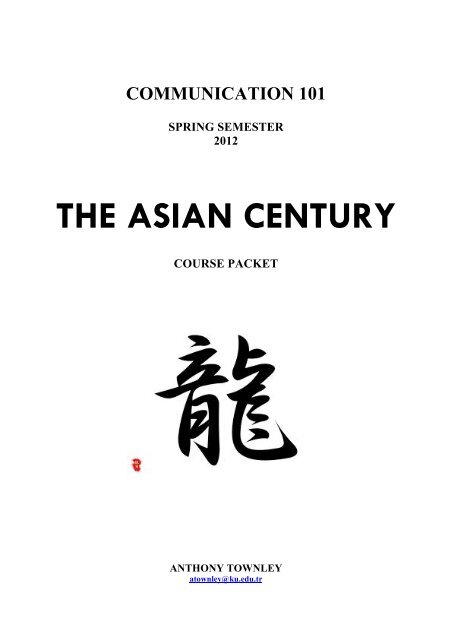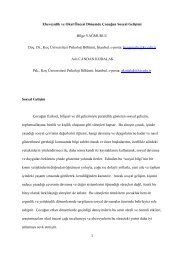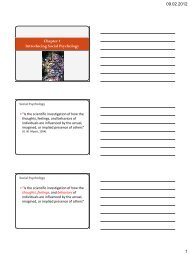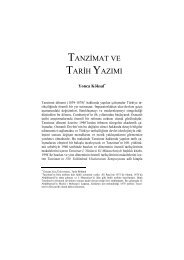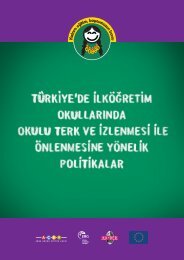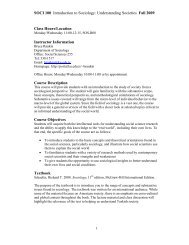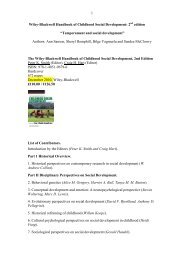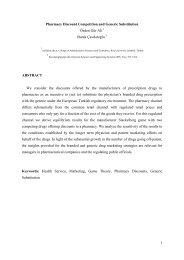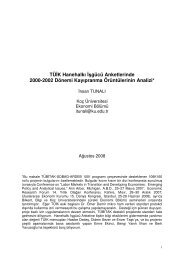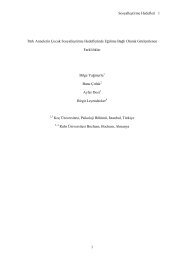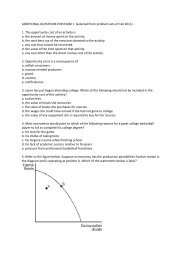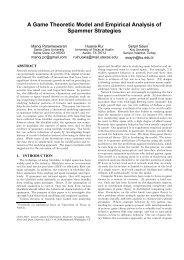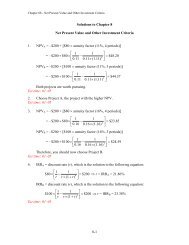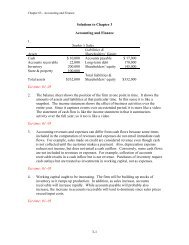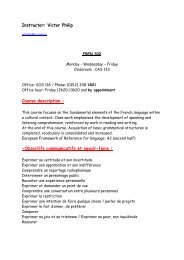Syllabus (pdf) - KUAIS - Koç University
Syllabus (pdf) - KUAIS - Koç University
Syllabus (pdf) - KUAIS - Koç University
You also want an ePaper? Increase the reach of your titles
YUMPU automatically turns print PDFs into web optimized ePapers that Google loves.
COMMUNICATION 101SPRING SEMESTER2012THE ASIAN CENTURYCOURSE PACKETANTHONY TOWNLEYatownley@ku.edu.tr
SYLLABUSInstructor: Anthony TownleyOffice: SOS 116Phone: Ext 1343Email: atownley@ku.edu.trOffice Hours: Monday – Thursday (by appointment)Course DescriptionComm 101 leads students to write text-based essays in the context of a particular academic theme, inother words, to do what we do in an academic community—participate meaningfully in a discoursethat is already on-going. As apprentices, they read texts from various authors to become familiar withwhat the issues are, how we talk about them, and what positions we might take. Further reading helpsthem to explore and understand how an argument is effectively constructed. Through summary,paraphrase, and personal response they develop the skills to formulate their own perspective. Thisprocess leads to an analytical essay grounded in one academic text, an assignment for which studentsplan, draft and revise. The second assignment asks students to apply their reading and writing skills aswell as their familiarity with the discipline to an essay synthesizing material from two texts. By theend of the course, they should be able to apply the skills they have learned to any number of academicfields. Among others, these skills should include:• Developing a process based approach to academic writing.• Learning to organize and express ideas in a manner appropriate to audience and purpose.• Understanding the importance of grammatical accuracy.• Becoming familiar with strategies for different kinds of writing.• Being introduced to and beginning to accurately use summary, paraphrase & quotation.• Being introduced to and beginning to accurately use academic vocabulary.• Writing formal papers using basic word processing and proper formatting.Course ThemeJust as Britain influenced the course of the 19th Century and America much of the 20th, many nowbelieve the 21st will be the Asian Century. The empirical evidence certainly makes a strong case forthis proposition; Asia will have more than five billion people by 2050, while the European Union’sshare of the global population will decline from nine to five percent. Asia’s influence over the world atlarge has increased in line with a strong economic growth rate that over the past 30 years has averagedfive per cent every year and its GDP is projected to increase from $30 trillion now to about $230trillion by 2050. This Comm 101 course will examine how the balance of power in social, economicand political terms is rapidly shifting from the West to the East with some particular focus on Turkey’spotential future relationship with the Asian region.Course Requirements & GradingTwo formal academic essays: drafts, revisions, and final drafts 50%Essay One: 20%First Draft: 5%Final Draft: 15%
This 2-3-page essay should demonstrate understanding of a specified text and provide a thoughtfulresponse to that text. A detailed description of the essay prompt will be handed out in class.Essay Two: 30%First Draft: 10%Final Draft: 20%In this 4 - 5 page essay, your response should focus on a synthesis of two main texts. Your essayshould summarize relevant parts of two texts, and then discuss how one text responds to the other as away to contribute something meaningful to the on-going dialogue about Asia’s role in the 21 stCentury. A detailed description of the essay prompt will be handed out in class.In-class Writing Assignment: 10%This in-class writing assignment will involve a single summary of a single text. On the day of theassignment you will receive a detailed writing prompt in relation to a particular text.Formal Writing Exercises and Homework 20%Oral Component 10%Participation / Quizzes 10%Grading CriteriaCompositions will be graded based on the following criteria:Content: 40%Organization and Development: 30%Grammar and vocabulary 30%Note: All assignments done outside of class must be typed, double-spaced, spell checked, printed onA4 paper, completed on time AND be your own work.Required Course Materials1. Diane Hacker Handbook for Writers2. Course Packet – This is available in the Xerox center of the library (located on bottom floor). Yourcourse packet will be under your instructor’s name.3. English/English dictionary4. Binder5. Writing Implements: pen or pencil, eraser, notebook6. StaplerClass Attendance and ParticipationClass attendance is required, and any absences will negatively impact your participation grade.If you accumulate more than 5 unexcused absences, it will result in a reduction of your final grade forthe course: 6 unexcused absences = 5% penalty, 7 = 10%, 8 = 15%, 9= 20%. If you accumulate morethan 9 unexcused absences, you will automatically fail the course. Consult with your instructor if youbelieve there are extenuating circumstances that have made it impossible for you to regularly attendclass. Please come to class on time; each three times you arrive to class more than five minuteslate will count as one absence.
Policy on Late WorkThere is a five-point penalty for each day an assignment is late, and work submitted after thedeadline for the next assignment has passed will not be accepted. For example, an outline for apaper submitted on or after the deadline for the submission of the first draft will not be accepted.Furthermore, no student work will be accepted unless all previous stages of the assignment have beencompleted. For example, a student who has not submitted a research paper proposal on or before thedeadline for the outline may not submit the outline. Instructors are not obliged to provide feedback onlate work.Plagiarism and Collusion PolicyPlagiarism is presenting someone else's words or ideas as your own, without proper reference. Youare graded on your own individual work, not another's masquerading as your own. Any student foundplagiarizing on or colluding in writing assignments may fail the assignment, fail the course, and/or bereferred to the university's disciplinary council. This may result in suspension from the university.You commit plagiarism when:• You copy someone else's writing and do not put it in quotation marks and identify the source.• You take someone else's writing, change some of the words, and do not identify the source.• You take someone else's ideas or sequence of ideas, put them into your own words, and do notidentify the source.• Someone else writes your assignments or changes your writing and thus creates a falseimpression of your abilities.You engage in collusion when:• You receive unauthorized help with your writing by paying or otherwise inducing anotherperson to do the writing for you.Grading ScaleA = 100 – 90% B+ = 86 - 83% C+ = 76 - 73% D+ = 66 - 63% F = 59 – 0%A- = 89 – 87% B = 82 - 80% C = 72 – 70% D = 62 – 60%B- = 79 – 77% C- = 69 – 67%Classroom Code of ConductStudents at <strong>Koç</strong> <strong>University</strong> are required to adhere to classroom code of conduct and to refrain from allforms of unacceptable behavior during lectures. The activities which are prohibited in class includebut are not limited to:• Using cell phones and other electronic devices: All cell phones should be switched off beforeentering the lecture room. If you expect a very important call, please switch your phone tosilent mode and let your professor know in advance that you may receive a call.• Using laptops for purposes that are not course-related.• Arriving late or leaving early without the prior permission of the instructor.• If you have to leave during class for an emergency, please try to minimize the disruption.• Working on personal activities or the assignments of other courses.• Eating and drinking are allowed as long as impact on others is minimized and students cleanup their garbage after class.Failure to comply with the Classroom Code of Conduct may result in dismissal from class anddisciplinary action.
SCHEDULENote that this is a tentative schedule and is subject to changes. Any changes will be notified to allstudents at the same time in advance.Week Course Work & Activities Assessment & Due Dates16/2 –10/2213 –17/2320/2 –25/2427/2 –2/355/3 –9/3612/3 –16/3719/3 –23/3826/3 –30/392/4 –6/4• Introduction to syllabus, course theme and to basicsof academic writing• Explore course packet• Discuss in-class writing sample• In-class writing sample• Features of Academic Writing• Academic Essay Structure• Critical & Strategic reading strategies• APA referencing• Summary & Paraphrasing• APA referencing• Discuss reading and essay prompt• Introductions & Conclusions• Specific preparation work for Essay 1• Tutorial Consultations for First Draft• Class Feedback for Final Draft• Introduce Oral Presentation task requirements• Library visits – research for oral presentationORAL PRESENTATIONS(10%)Reading #1Reading #2Reading #3Reading Exercise (5%)Paraphrase Exercise(5%)Reading for Essay 1Reading #4APA Exercise (5%)1st Draft Essay 1 dueFriday 16 March (5%)Final Draft Essay 1 dueFriday 30 March (15%)
109/4 –13/4SPRING BREAKNo Classes1116/4 –20/4• Discuss readings for Essay 2 and essay prompt• Specific preparation work for Essay 2Readings for Essay 21223/4 –27/41330/4 –4/5Children’s Day (No Class) – 23 RD April• Specific preparation work for Essay 2• Synthesizing information and discussion fromdifferent textsLabor Day (No Class) - 1st May• Specific preparation work for Essay 2Synthesis WritingExercise (5%)1st Draft Essay 2 dueFriday 4 May (10%)147/5 –11/51514/5 –18/5• Tutorial Consultations for First Draft• Course Review and looking ahead to disciplinespecificacademic writingIn-class WritingAssignment (10%)Final Draft Essay 2 dueFriday 18 May (20%)


